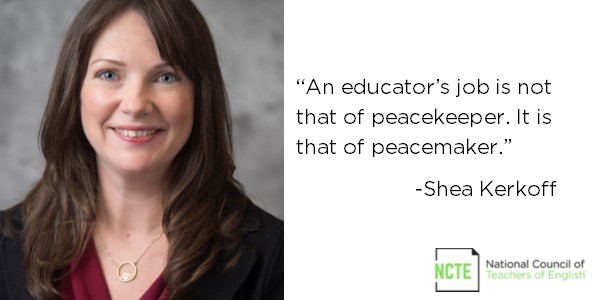This post is written by member Shea Kerkhoff.
When I opened Twitter on the evening of Saturday, August 12, my feed was full of educators’ responses of outrage at what happened in Charlottesville, Virginia, and the aftermath. I quickly closed my app. The rest of that night, I ignored Twitter, Facebook, even direct personal messages about the event. I didn’t turn on the TV. I couldn’t . . . or, more accurately, wouldn’t. I didn’t want to feel the deep sense of loss and sadness that was sweeping over me. I realized that I was acting out of white privilege, but I continued to shut out the news and my feelings. I could ignore these sad feelings, because for me the feelings would diminish as soon as the headlines found a new interest. For my friends of color, racism isn’t a 24-hour news cycle, but a daily reminder of the hate in our world.
It’s time to stop ignoring what’s going on. As a teacher, it’s my responsibility to help my students make a better world.
I’ve heard too many of my students use the same rhetoric as that coming out of the White House: “Both sides are to blame” or “it’s my job to de-escalate the situation, to keep the peace.” But an educator’s job is not that of peacekeeper. It is that of peacemaker. Peace is not made through a lack of violence, but through social justice, when the righteous are declared and the evil condemned.
Tolerance is a moral stance, not a neutral stance, calling for acceptance of difference but not of evil. Let us not fall prey to the paradox of tolerance; let us teach intolerance of intolerance.
Let us not teach critical literacy and poststructuralism to the point where students trust no one and nothing. Let us teach them to question what they see in order to seek truth. Their history textbooks may read that Rome had peace for 200 years, but a country wracked with oppression, even slavery, is not at peace. Let us teach our students that blanket condemnation of violence does not lead to peace. Peace is living in equality and harmony with others.
In light of recent tragic events in Charlottesville, it’s time to double down on our commitment to education for social justice. To give you the tools to follow through on your commitment to social justice this school year, here is a link to an English Education special journal issue guest edited by April Baker-Bell, Tamara Butler, and Lamar Johnson dealing with racial violence: From Racial Violence to Racial Justice: Praxis and Implications for English (Teacher) Education.
Shea Kerkhoff received her PhD in literacy from North Carolina State University. She now teaches adolescent literacy and young adult literature at Purdue University and is assistant editor of English Education.

